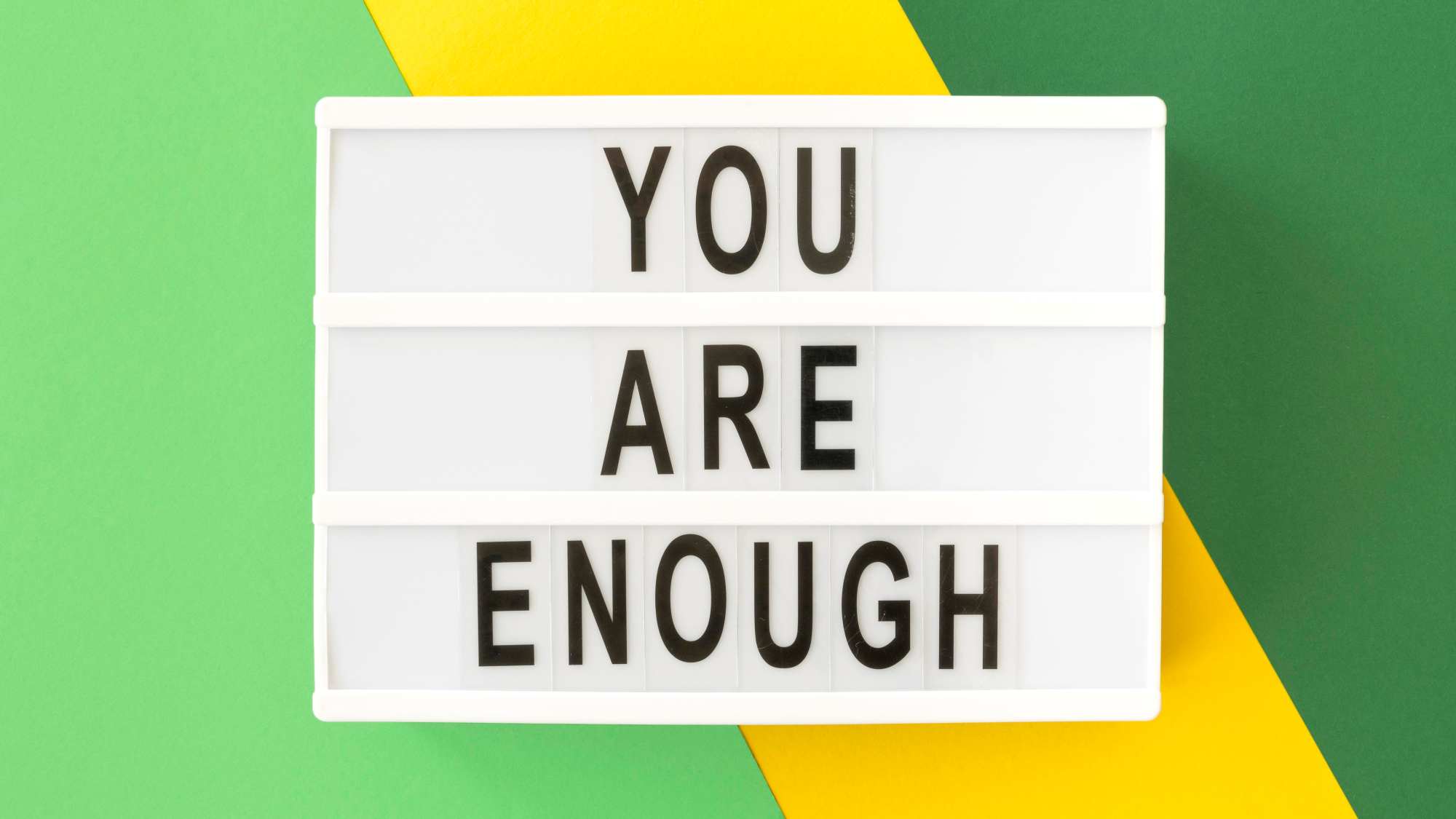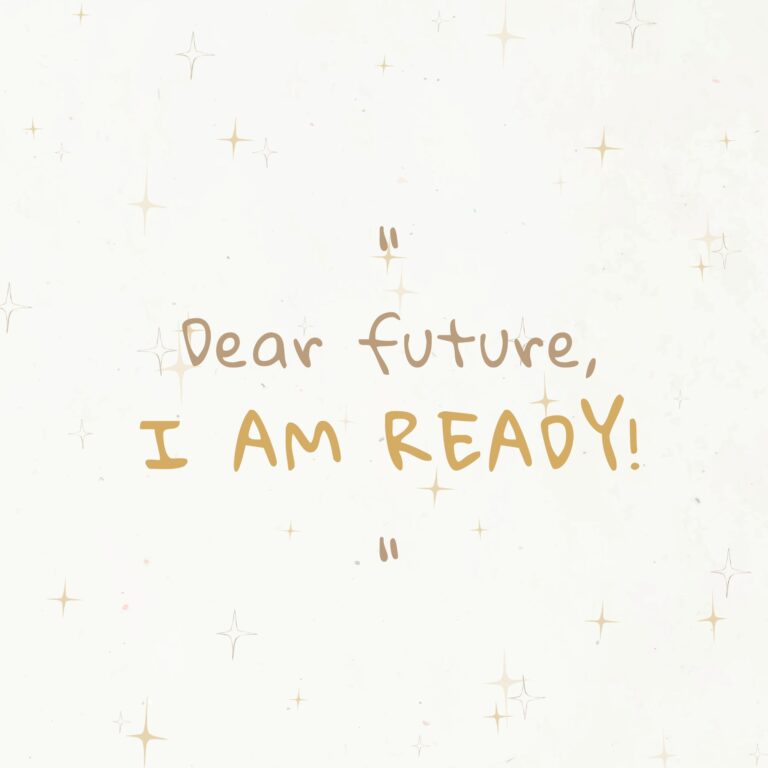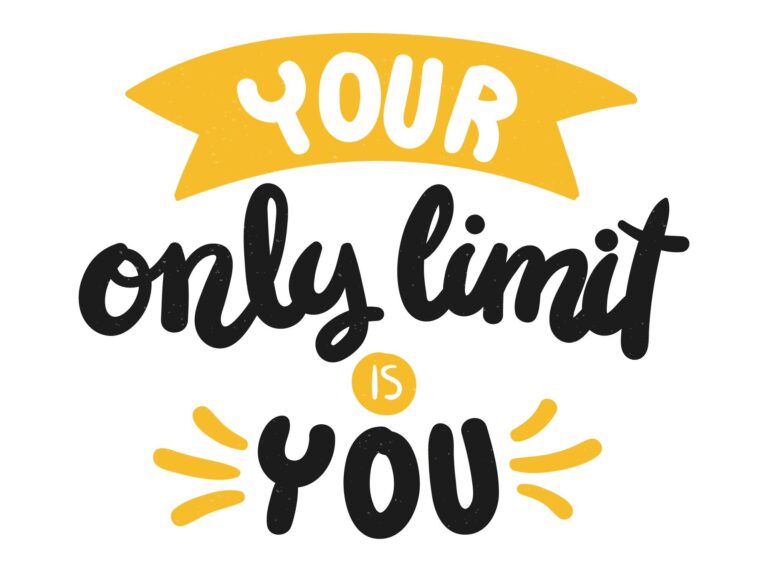How to identify limiting beliefs that sabotage you
You keep saying you want to change your life, but every time an opportunity shows up, you find a reason why it won’t work for you. “They probably want someone with more experience.” “I’m not smart enough to get in anyway.” “I don’t have what it takes.” “People like me don’t do things like that.”
Those aren’t facts. Those are limiting beliefs, and they’ve been running your life without you even realizing it. Let’s be honest – you’re not protecting yourself from disappointment. You’re sabotaging yourself before you even try. And you’ve been doing it for so long, it feels normal.
Every time you think “I’m not good enough” or “I can’t do this,” you’re literally programming your brain to prove you right. Those thoughts aren’t keeping you safe – they’re keeping you stuck.
These beliefs aren’t protecting you from failure – they’re guaranteeing it. Because when you don’t even try, you’ve already failed. But the thing is – these beliefs aren’t facts about you. They’re just stories you picked up along the way, and you have the power to rewrite them today.
What limiting beliefs actually are (and why they feel like facts)
Limiting beliefs are basically the lies you tell yourself about what you can’t do, what you don’t deserve, or who you’re not allowed to become. They feel true because you’ve been repeating them for so long that your brain has filed them under “facts about me” instead of “random thoughts I picked up somewhere.”
Think about it this way: if someone told you every single day for ten years that you were terrible at singing, wouldn’t you start to believe it? Even if you’d never actually tried to sing?
That’s what’s been happening in your head. You heard something once – maybe from a teacher, a parent, or even yourself after a bad experience – and you’ve been treating it like gospel ever since.
Your brain doesn’t fact-check your thoughts. It just accepts whatever you keep telling it and then goes out of its way to prove you’re right.
If you believe you’re not good enough, your brain will focus on every mistake and ignore every success. If you believe you always mess things up, your brain will remember the failures and forget the wins.
It’s not trying to hurt you – it just wants everything to make sense, even if that “sense” is keeping you miserable. Your limiting beliefs aren’t insights. They’re not wisdom. They’re not you being “realistic.” They’re outdated programming that’s running your life.

The ways limiting beliefs control your life
These beliefs don’t just sit quietly in your head. They run the show. Here’s how they’re probably controlling your life right now:
They make your decisions for you: You automatically say no to opportunities without even considering them. You don’t apply for jobs you want because you assume you won’t get them. You don’t start projects because you’re convinced you’ll quit halfway through.
They change how you see yourself: You look in the mirror and only notice flaws. You replay your mistakes but dismiss your successes as luck. You compare yourself to everyone else and always come up short.
They sabotage your relationships: You don’t speak up when something bothers you because you don’t want to be “difficult.” You settle for people who treat you poorly because you don’t think you deserve better. You push away good people because you’re waiting for them to realize you’re not worth it.
They keep you playing small: You don’t share your ideas because you assume they’re not good enough. You don’t go after what you want because you’re convinced it’s not meant for people like you. You stay in situations that drain you because you think it’s the best you can do.
Sound familiar? That’s not you being realistic – that’s your limiting beliefs calling the shots. Let’s be real – when was the last time you made a decision based on what you actually wanted instead of what you thought was “safe” or “realistic”?
The most common limiting beliefs (and how they’re ruining your life)
“I’m not good enough”
This is the big one. It’s the belief behind almost every other limiting belief you have.
It shows up when you work twice as hard as everyone else but still feel like a fraud. When you get a compliment and immediately think of all the ways it’s not true. When you achieve something and chalk it up to luck instead of recognizing your own abilities.
You might not say “I’m not good enough” out loud, but you live like it’s true. You apologize for existing. You make yourself small so others feel comfortable. You put everyone else’s needs before your own because you don’t think yours matter as much.
What’s this costing you? Everything. You’re not going after opportunities. You’re not asking for what you want. You’re not standing up for yourself. You’re living like you have to earn the right to take up space.
“I’m not smart enough”
You avoid challenges because you’re convinced you’ll look stupid. You don’t speak up in meetings even when you have good ideas. You let other people make decisions because you assume they know better.
You might say things like “I’m not a math person” or “I’m not good with technology” – as if intelligence is fixed and you got dealt a bad hand.
You avoid learning new things because you’re afraid of that awkward phase where you don’t know what you’re doing yet. So you stay stuck in what you already know, even if it’s not working for you.
The truth: Intelligence isn’t fixed. You’re not “not smart enough” – you just haven’t learned certain things yet. There’s a difference.

“I don’t deserve good things”
When something goes well in your life, you wait for the other shoe to drop. When someone treats you well, you wonder what they want from you. When you achieve something, you minimize it or give the credit to someone else.
You sabotage good relationships because you’re convinced the person will figure out you’re not worth it eventually. You don’t go after opportunities because you think they’re meant for “other people” – people who are somehow more deserving than you.
You might even feel guilty when good things happen, like you’re taking something away from someone who deserves it more.
What’s this really about? You’ve confused humility with self-destruction. There’s a difference between being grateful and believing you don’t deserve anything good.
“It’s too late for me”
You’ve decided your best years are behind you. Maybe you’re 35 and think you’re too old to change careers. Maybe you’re 50 and think you missed your chance at love. Maybe you’re 25 and think you should have figured everything out by now.
You look at other people who are successful and assume they started earlier, had better opportunities, or just got lucky. You use your age, your circumstances, or your past decisions as evidence that you’ve missed your window.
So you don’t even try anymore. You settle for what you have because you’ve convinced yourself it’s too late to want anything else.
Let’s be honest – you’re not too late. You’re just scared. And you’re using age as an excuse to avoid the discomfort of starting something new.
“I always mess things up”
You take one failure and turn it into evidence about your entire character. You started a diet and didn’t stick to it, so now you’re “someone who can’t commit to anything.” You made a mistake at work, so now you’re “bad at your job.”
You replay your failures on repeat but forget about your successes. When something goes wrong, you take all the blame. When something goes right, you assume it was outside factors.
You’re so afraid of making another mistake that you stop trying new things altogether. Better to do nothing than to risk proving yourself right about being a failure.
The truth: You’re human. Humans make mistakes. The people who succeed aren’t the ones who never fail – they’re the ones who don’t let failure become their identity.
“People will judge me”
You’re so worried about what others think that you’ve made yourself invisible. You don’t share your opinions because someone might disagree. You don’t pursue your dreams because someone might think they’re stupid. You don’t even dress the way you want because you’re afraid of standing out.
You assume everyone is watching you and judging your every move. You take other people’s moods personally, thinking their bad day must be about something you did. You say yes to things you don’t want to do because you’re afraid of disappointing people.
You’ve made other people’s comfort more important than your own authenticity. And the ironic thing? Most people aren’t thinking about you nearly as much as you think they are.
The truth: People are too busy worrying about their own lives to spend much time judging yours.
“I’m not [adjective] enough”
Fill in the blank: attractive, talented, experienced, confident, creative, disciplined, worthy…
These beliefs are specific but they all come from the same place – the idea that you’re somehow broken at your core. That other people have something you don’t, and you can’t get it.
You might think successful people are just “naturally confident” or that creative people are born with some special gift you don’t have. You assume other people’s lives are easier because they don’t have your particular limitations.
The truth? Everyone feels like they’re not enough in some area. The difference is that some people do things anyway, and others let the feeling stop them.

How to catch limiting beliefs
The sneaky thing about limiting beliefs is that they’re so automatic, you don’t even hear them anymore. They’re like background music in your mind. But once you know what to look for, you’ll start noticing them everywhere. Here’s how to catch them in action:
Listen to your automatic responses
Pay attention to what you say when opportunities come up. Do you immediately think of reasons why something won’t work? Do you automatically assume you’re not qualified? Do you default to “I could never do that”?
Those instant reactions are your beliefs talking.
Try this: For one week, write down every automatic “no” response you have. Don’t judge it, just notice it. You’ll be shocked at how often you talk yourself out of things before you even consider them.
Notice what you avoid
What dreams do you dismiss before you even consider them? What opportunities do you automatically say no to? What conversations do you avoid having?
Your beliefs aren’t just thoughts – they’re controlling your behavior. If you’re consistently avoiding certain types of challenges or opportunities, there’s probably a limiting belief behind it.
Ask yourself: What am I not doing because I’ve decided I “can’t” or I’m “not the type of person who” does that thing?
Track your self-talk after challenges
When something goes wrong, what’s the first thing you tell yourself? If it’s harsh, critical, or includes words like “always,” “never,” “typical,” or “I should have known better,” you’ve found a limiting belief.
Normal response to a challenge: “That didn’t go as planned. What can I learn from this?” Limiting belief response: “I knew I’d mess this up. I always do.”
See the difference? One is about the situation. The other is about your identity.
Watch your emotional reactions to other people’s success
When you see someone else succeeding in an area you want to improve, how do you feel? If it’s genuine happiness, great. But if you feel jealous, bitter, or defeated, pay attention to the thoughts that come up.
“They’re so lucky.” “It’s easy for them.” “I could never do that.” “They probably had connections.” These are all limiting beliefs trying to explain away someone else’s success so you don’t have to face the possibility that you could succeed too.
Your reaction to other people’s success tells you everything about what you believe is possible for you.
Notice your energy drains
What situations consistently leave you feeling drained, anxious, or small? Often, these are situations where your limiting beliefs are working overtime.
If networking events exhaust you, you might have beliefs about not being interesting enough. If asking for help feels impossible, you might believe you have to do everything yourself. If receiving compliments makes you uncomfortable, you might not believe you deserve them.

The questions that will help you identify limiting beliefs
- What opportunities have I said no to this year, and what was my real reason?
- What would I do if I knew I couldn’t fail?
- How do I talk to myself when I make a mistake?
- What compliments do I have trouble accepting?
- What do I always seem to struggle with, no matter how hard I try?
- What would I do if I believed I was capable of anything?
- What am I afraid people will discover about me if I really go for what I want?
- What type of person do I feel intimidated by, and what does that say about me?
Write down your answers. The patterns will show you exactly which beliefs have been running your life.
Daily practices that break the cycle
Identifying your limiting beliefs is just the beginning. Now you need to actively work on changing them. Here are three simple daily practices to get you started:
The belief interrupt
Every time you catch a limiting belief in action, stop and interrupt it with these questions:
- Is this actually true, or is this just a story I’ve been telling myself?
- What evidence do I have that contradicts this belief?
- What would I do differently if I didn’t believe this?
You don’t have to come up with perfect answers. Just asking the questions starts to weaken the belief’s hold on you.
The small rebellion
Every day, do one small thing that contradicts your limiting belief. If you believe you’re not interesting, start one conversation. If you believe you’re not creative, spend five minutes on something artistic. If you believe you always quit, finish one small task.
These don’t have to be huge actions. Small, consistent rebellions against your limiting beliefs add up to massive change over time.
The reframe practice
Every evening, think about the limiting beliefs that showed up during your day. For each one, practice reframing it:
Instead of “I messed up again,” try “I’m learning and improving.” Instead of “I’m not good enough,” try “I’m working on becoming better.” Instead of “I always fail,” try “Sometimes things don’t work out, and that’s how I gain experience.”
You don’t have to believe the new thoughts completely yet. Just practice thinking them.

Why this work matters more than you think
Changing your limiting beliefs isn’t just about feeling better about yourself (though that’s nice too). It’s about reclaiming your life.
Every decision you make is filtered through your beliefs. Every opportunity you consider goes through the lens of what you think is possible for you. Every relationship you have is shaped by what you believe you deserve.
When you change your beliefs, you change everything.
You start saying yes to opportunities that used to scare you. You stop settling for relationships and situations that drain you. You begin pursuing things you actually want instead of just what feels safe.
You stop making yourself small to make others comfortable. You stop apologizing for taking up space. You stop editing yourself to fit into boxes that were never meant for you anyway.
Most importantly, you start treating yourself like someone who matters. Because you do.
Let’s be real – how much longer are you going to let these beliefs run your life? How many more opportunities are you going to talk yourself out of? How much more of your potential are you willing to waste?

Your next step (because reading isn’t enough)
Here’s what I want you to do right now – not tomorrow, not next week, right now:
Step 1: Identify your biggest limiting belief. The one that’s been calling the shots in your life. The one that makes you say no to opportunities, play small in relationships, or settle for less than you want.
Step 2: Write it down. Make it real by putting it on paper.
Step 3: Ask yourself: “What would I do this week if I didn’t believe this anymore?”
Step 4: Do one small thing from that list. It doesn’t have to be huge. Just one small action that proves to yourself that this belief doesn’t have to control you.
You’ve been living according to these beliefs for years. Where has it gotten you? Maybe it’s time to try something different. You have more power than you think. You’ve just forgotten how to use it.
Ready to do the deeper work? The Limiting beliefs (30 days) workbook gives you structured, daily exercises to identify, challenge, and rewrite the beliefs that have been holding you back. Because reading about change is one thing – actually doing the work that creates lasting transformation is another.
This isn’t about positive thinking or pretending your problems don’t exist. It’s about recognizing that the biggest obstacle between you and the life you want isn’t your circumstances – it’s the stories you’ve been telling yourself about what’s possible.
Time to rewrite those stories.
Explore the Limiting beliefs workbook and start destroying the beliefs that have been running your life for too long.
Your future self is waiting for you to stop believing the lies and start living your truth.







